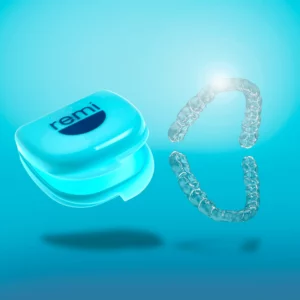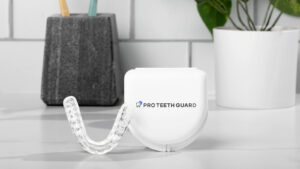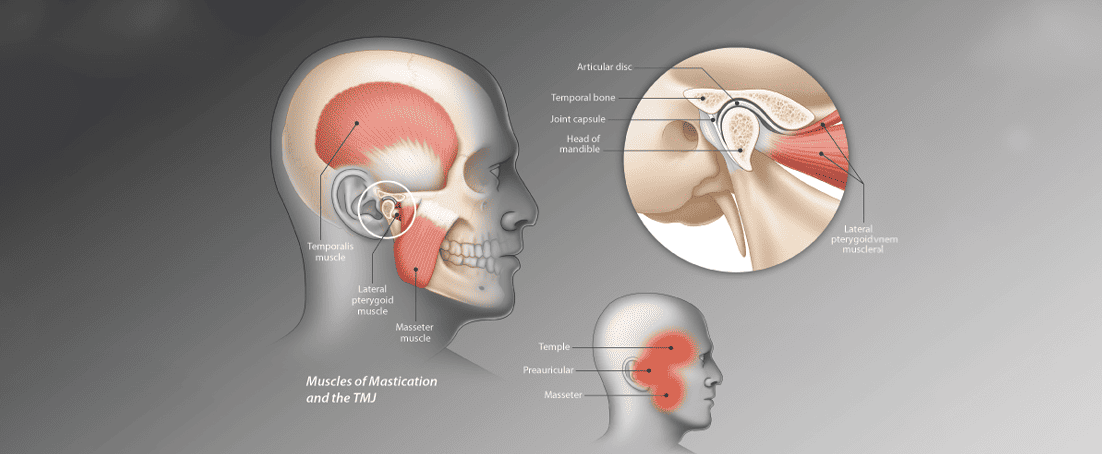Night guards, or occlusal guards, assist in maintaining your oral health by reducing tooth grinding (bruxism) and clenching when sleeping. These mouth guards are efficient at protecting your teeth and jaw, but they also have drawbacks and issues. Some typical night guard side effects include:
- Discomfort or jaw pain
- Excessive salivation
- Jaw misalignment
- Difficulty speaking
- Allergic reactions
But what could be the solution for the dental night guard’s side effects? Below, we’ve compiled a detailed guide to help you address the side effects and find solutions. Follow us through!
Why Dental Night Guards are a Nighttime Necessity
Night guards are essential if you grind teeth or clench jaws while sleeping for a variety of reasons, including:
- Teeth Protection: Grinding teeth leads to worn-down enamel, chipped teeth, and fractures. Night guards operate as a barrier between the upper and lower teeth. This keeps them from grinding against each other and protecting the teeth from harm.
- Improving Sleep Quality: Bruxism interrupts sleep, causing restlessness and, in extreme cases, waking up due to jaw pain or discomfort. Night guards help reduce these disruptions, allowing for a more comfortable night’s sleep.
- Preventing Additional Dental Complications: Untreated bruxism can lead to serious dental issues such as TMD, gum recession, and tooth loss. A night guard is a preventative strategy, targeting the root source of teeth grinding.
- Preventing Jaw Pain and Muscle Tension: Clenching the jaw, teeth chattering, and grinding can cause jaw pain, facial muscle tension, and migraines. A night guard aids by cushioning the impact and pressure on the jaw joint and surrounding muscles, thereby reducing discomfort.
Over-the-Counter Night Guards: Not All Created Equal


High-grade, over-the-counter night guards stand out from the competition because of their design, material quality, and personalization possibilities. Here’s an overview of the best mouth guards for teeth grinders and why they stand out from cheaper alternatives.
Pro Teeth Guard
Pro Teeth Guard emerges as a standout solution for bruxism and teeth sensitivity, offering unmatched customization to combat mild bruxism. Unlike the typical generic options, this guard is tailored to fit perfectly using an impression of your teeth, ensuring comfort and efficacy. The process is simplified with an easy-to-use kit and straightforward instructions, making it user-friendly. Crafted with precision and durability in mind, Pro Teeth Guard’s meticulous design caters to individual needs, delivering both comfort and satisfaction for those seeking a personalized bruxism guard. Here you can find Pro Teeth Guard reviewed in more detail.
Remi Night Guard
The Remi night guard is an essential tool in the battle against bruxism, renowned for its durable yet ultra-thin construction. It provides a comfortable wearing experience that doesn’t compromise on protection due to its robust material and sleek design. This guard is especially appealing for its unobtrusive fit, perfect for those who prefer a more inconspicuous method of addressing teeth grinding. For an in-depth understanding of Remi’s unique benefits and comparison with other brands, delve into our comprehensive review of the Remi night guard.
Moreover, our customers can now purchase Remi Night guard using a special code and get an awesome discount on their products. Don’t miss it and get your teeth protected using the link below!
Cheap Night Guard Options: Penny Wise, Pound Foolish
Going for cost-effective choices makes a lot of sense when you’re looking to save money. However, as sensible as it may seem, choosing cheap $5-50 guards might result in some drawbacks that may outweigh the initial cost savings. They include:
- Poor Fit: Over-the-counter night guards are not custom-fitted to your teeth and jaw. Inadequately fitting guards may shift during sleep, limiting their effectiveness.
- Guard Discomfort: Low-cost guards are frequently composed of inferior materials and may be bulky, inflexible, or poorly fitted for comfort. Uncomfortable guards can cause trouble sleeping, excessive salivation, and even jaw pain.
- Effectiveness: Chepaest of OTC guards don’t provide the essential thickness or protection for severe bruxism. Therefore, the night guard may potentially cause tooth damage.
Night Guard Side Effects & Quick Fixes
1. Discomfort and Irritation
Night guards may sometimes cause discomfort, irritation, and soreness, especially when first worn or if they’re not correctly fitted.
Immediate Remedies:
- Adjustment Period: Allow yourself some time to become accustomed to wearing the night guard.
- Edges Softening: To avoid irritation, smoothen any rough edges on your night guard with a nail file or follow the manufacturer’s recommendations.
- Fitting: Ensure the night guard fits properly. Consider readjusting or consulting a dentist for optimal fit if it feels tight or loose to avoid potential side effects.
2. Mouth Guard Side Effects on Gums
Mouthguards cause gum irritation, especially if they’re bulky or have limited air circulation in the mouth.
Quick Solutions:
- To avoid bacteria growth, maintain appropriate oral hygiene, including rinsing the mouth guard before and after usage.
- If gum sensitivity persists, see your dentist about adjusting the night guard or switching to another type.
3. TMJ Mouth Guard Side Effects
Certain mouthguards, particularly if not correctly fitted or made, have side effects that may aggravate the symptoms of TMJ disorders.
Solutions:
- Consult a dentist about a custom-fitted guard built exclusively for TMJ symptoms.
- See a TMJ specialist for a specific treatment plan.
4. Silicone Night Guard Side Effects
Allergic Reactions: Some people may be allergic to silicone, resulting in redness, itching, or swelling after dentistry treatment
Remedy:
- If allergic reactions occur, discontinue use and consult a healthcare practitioner. Consider switching to a new material or type of night guard, such as one that is latex-free or BPA-free.
5. Dry Mouth from a Mouth Guard – a Common Problem
Dry mouth is a common complaint among those who wear night guards, especially when sleeping with dental night guards.
Solutions for Dry Mouth:
- Stay Hydrated: Before going to bed, ensure you’re properly hydrated. Drink plenty of clean water and avoid caffeine and alcohol.
- Saliva Substitutes: Use over-the-counter saliva substitutes or oral moisturizers explicitly formulated to relieve dry mouth. These products assist in simulating the function of saliva.
- Hydrating Mouth Sprays or Gels: Using oral moisturizing sprays or gels before putting on the mouth guard helps keep the mouth moist while sleeping.
6. Mouth Guard Psychological Side Effects – a Common Problem
Mouth guards are a foreign object in the mouth, and some people experience psychological adverse effects from this. These issues are anxiety, claustrophobia, sleep apnea, or discomfort.
Solutions for Psychological Side Effects:
- Gradual Acclimatization: Wear your mouth guard for small amounts of time throughout the day to gradually become acclimated to the sensation.
- Relaxation Techniques: Try mindfulness activities to alleviate any anxiety or discomfort caused by wearing the night guard.
- Distraction Methods: When wearing a mouth guard, engage in activities or hobbies you enjoy. This can take the focus away from the discomfort of the dental protector.
What Happens When You Don’t Guard at Night
There are certain potential dental night guard side effects or implications of not wearing a night guard, especially if you have bruxism. For example, teeth grinding cause ear pain in many patients who seek help.
Common Challenges
- Teeth Damage: Teeth grinding without a sleep guard causes enamel wear and tear, resulting in chipping, fractures, or teeth flattening.
- Sleep Disruption: Teeth grinding can impair sleep quality, causing sleep interruptions.
- Jaw Discomfort and Pain: The constant pressure of teeth grinding causes jaw discomfort, headaches, and muscular tension, finally causing a misaligned jaw.
- TMJ Disorders: Prolonged bruxism without protection can aggravate or cause TMJ disorders, which include pain, clicking, or limited jaw mobility.
Solutions-Oriented Approaches:
- Wear the Suggested Night Guard: Following your orthodontist’s advice and using the prescribed sleep guard appliance regularly will considerably lessen or prevent these concerns.
- Regular checkups: Go for regular checkups at the dentist for any changes or improvements in your condition and the efficiency of the night guard.
- Custom-Fit Night Guards: For maximum comfort and safety, consider investing in a custom-fitted night guard. Custom-made guards fit the form and needs of your mouth, thereby increasing their effectiveness and ease.
- Stress Reduction Strategies: Look into strategies or therapies to help reduce bruxism, as stress is a common cause of teeth grinding.
Plastic Isn’t Always Fantastic
While plastic mouthguards are widely used and inexpensive, they may not be appropriate for everyone for the following reasons:
- Comfort and fit: Plastic one-size-fits-all mouthguards may not be the ideal fit for everyone, and inadequately fitting guards means inefficient protection.
- Toxicity: Some plastic materials may include toxic substances such as BPA (bisphenol A) or phthalates. These elements cause discomfort and health problems for some people.
- Difficulties with breathing: Thick or bulky plastic guards can obstruct breathing, particularly during vigorous activity or sleep.
Remedy Options for Plastic Mouthguards
- Custom-Fit Mouthguards: Choose a night guard that is custom-fitted by dental professionals. These are custom-molded to your teeth and provide improved comfort and protection.
- BPA-Free and Latex-Free Options: To decrease the danger of exposure to these potentially harmful substances, pick BPA and latex-free.
- Alternative Materials: Consider silicone mouth guards or newer materials like ethylene vinyl acetate (EVA). These are more flexible, less bulky, and devoid of potentially dangerous chemicals.
- Regular Replacement: Regardless of the material, replace your night guard regularly. Guards degrade with time, losing effectiveness and potentially harboring bacteria.
Understanding the consequences and all the mentioned night guard side effects of not wearing a night guard might leave you wondering, “Which one should I choose?” To cut through the confusion, we’ve put two of the top mouthpiece options to the test. In our eyes, below are the champions of comfort and defense for your teeth, ready for you to try out.


When to See the Specialist?
If you experience any of the following side effects and relate them to the use of a mouth guard, it’s advisable to see a dental specialist:
- When the initial soreness lasts beyond the adjustment period.
- If you have frequent mouth irritation or sores.
- Worsened TMJ discomfort or increased dental issues.
Final Thoughts
Dental night guards provide essential protection against teeth grinding and TMJ, but they have drawbacks. These adverse effects may include discomfort, jaw pain, gum irritation, and increased tooth sensitivity.
Over-the-counter night guards are a simple solution, but they don’t suit everyone with their generic sizing, restricted material options, and potential discomfort. Dentistry specialists provide custom-fitted guards that offer a personalized and superior fit, lowering the chance of adverse effects. They cater to individual needs and improve comfort.





